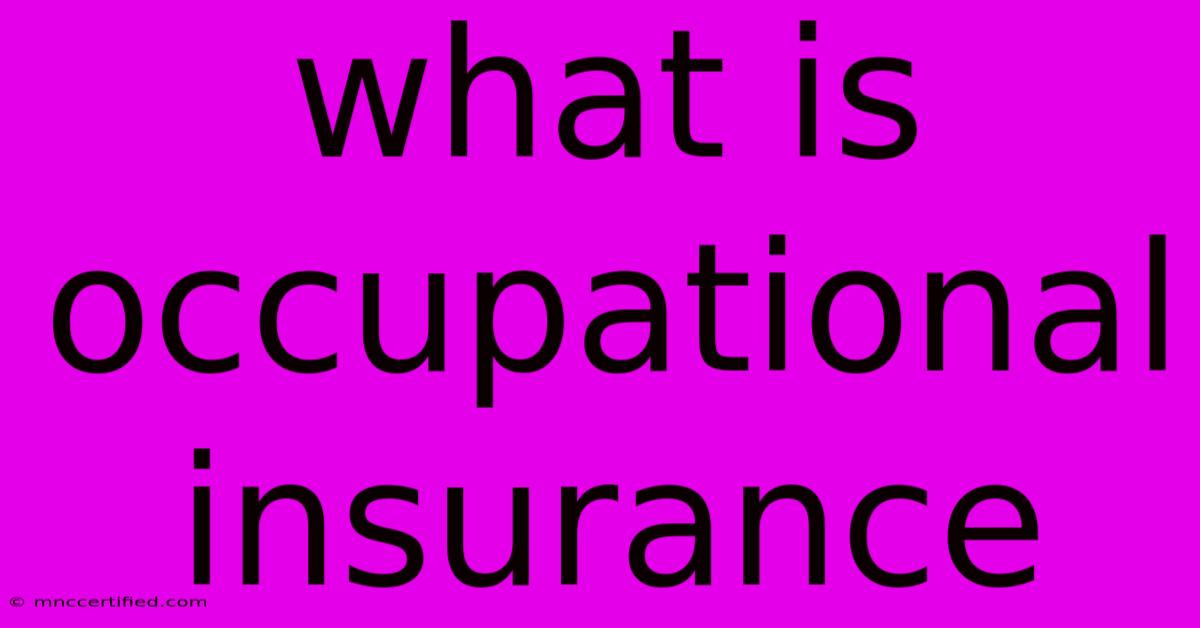What Is Occupational Insurance

Table of Contents
What is Occupational Insurance? A Comprehensive Guide
Occupational insurance, also known as professional liability insurance or errors and omissions (E&O) insurance, is a crucial safety net for professionals. It protects you from financial losses arising from claims of negligence, errors, or omissions in your professional services. This guide will delve into the intricacies of occupational insurance, explaining what it covers, who needs it, and how to choose the right policy.
What Does Occupational Insurance Cover?
Occupational insurance primarily covers financial losses resulting from claims alleging professional negligence or mistakes in your work. This can include:
- Errors and omissions: Mistakes or oversights in your professional services, such as miscalculations, missed deadlines, or flawed advice.
- Negligence: Failure to exercise the reasonable care and skill expected of a professional in your field.
- Breach of contract: Failure to fulfill the terms of a contract with a client.
- Copyright infringement: Unintentionally using copyrighted material in your work.
- Data breaches: Loss or unauthorized access to client data due to negligence. (Note: Cyber liability insurance often supplements this, providing broader coverage.)
- Reputational damage: While not directly compensated, a successful claim can help mitigate the financial impact of damaged reputation.
Important Note: Occupational insurance does not typically cover intentional acts, criminal activity, or physical damage. It focuses on professional liability, not general liability.
Who Needs Occupational Insurance?
While the need for occupational insurance varies by profession, it's highly recommended for anyone who provides professional services to clients. Here are some examples of professions that significantly benefit from this type of coverage:
- Doctors and other healthcare professionals: Medical malpractice insurance is a specific form of occupational insurance.
- Lawyers and paralegals: Legal malpractice claims can be incredibly expensive to defend.
- Financial advisors and accountants: Mistakes in financial advice or accounting can lead to significant financial losses for clients.
- Architects and engineers: Design errors can result in costly repairs or even lawsuits.
- Consultants: Providing inaccurate advice or failing to meet contractual obligations can lead to financial repercussions.
- Real estate agents: Errors in property transactions can expose them to liability.
- Writers and editors: Copyright infringement or defamation claims can be costly.
Essentially, if your work involves providing advice, expertise, or services that could potentially cause financial harm to your clients, you should seriously consider occupational insurance.
Choosing the Right Occupational Insurance Policy
Selecting the right policy involves several key considerations:
- Coverage limits: Choose limits that adequately protect you from potential financial losses. Consider the potential cost of defending a lawsuit and compensating a client for damages.
- Policy exclusions: Carefully review the policy to understand what is not covered.
- Premium costs: Compare premiums from different insurers to find a balance between cost and coverage.
- Insurer reputation: Research the insurer's financial stability and claims handling process.
- Specific needs: Some policies offer additional coverage options, such as defense costs or crisis management services. Consider your specific professional risks and choose a policy that addresses them.
The Importance of Occupational Insurance
Occupational insurance provides peace of mind and protects your livelihood. The cost of defending a professional liability lawsuit, even if you're ultimately found not liable, can be substantial. Occupational insurance helps mitigate these risks, allowing you to focus on your work without the constant worry of a potential financial catastrophe. It's a proactive investment that safeguards your professional reputation and financial well-being.
Frequently Asked Questions (FAQs)
Q: Is occupational insurance the same as general liability insurance?
A: No. General liability insurance covers bodily injury or property damage, while occupational insurance covers professional negligence or errors. Many professionals need both types of insurance.
Q: How much does occupational insurance cost?
A: The cost varies greatly depending on factors like your profession, coverage limits, and risk level.
Q: How do I find an occupational insurance provider?
A: You can find providers through online searches, professional organizations, or insurance brokers.
By understanding the scope and importance of occupational insurance, professionals can take a crucial step toward protecting their careers and financial futures. Don't hesitate to seek advice from an insurance professional to determine the best policy for your specific needs.

Thank you for visiting our website wich cover about What Is Occupational Insurance. We hope the information provided has been useful to you. Feel free to contact us if you have any questions or need further assistance. See you next time and dont miss to bookmark.
Featured Posts
-
Let Me Speak This Morning Clash
Nov 27, 2024
-
Degree Of Honor Life Insurance
Nov 27, 2024
-
Watch Barcelona Brest Ucl Match
Nov 27, 2024
-
Psg Squad Kimpembe Ramos Vs Bayern
Nov 27, 2024
-
Walmart Rolls Back Dei Initiatives
Nov 27, 2024